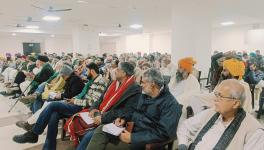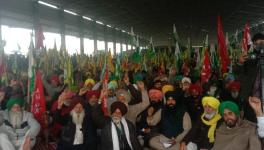In Haryana’s Palwal, the Farmers Protest Brings Down Longstanding Barriers
Clad in a grey suit to hold off the winter, Ratan Singh Sorot munches on groundnuts while waiting for people from neighbouring villages to arrive in their trolleys at National Highway-2 in Haryana’s Palwal. Sorot and other people from his Pal, or Khap, have already joined farmers from Uttar Pradesh and Madhya Pradesh who have been camping in Palwal to protest the recently-enacted Farm Laws and the Electricity (Amendment) Bill 2020.
One of the distinct features of the farmers’ protest at this border has been the ever-growing support from local farmers who once seemed hostile to the entire movement.
Sorot explained that the agitation is now being coordinated on a day-to-day basis, with members taking calls about the villages to be visited for campaigning. In return, the villages lend their support; not only thorough participation but sending groceries, gas cylinders, wood and donations. “Initially the movement was intense in the northern and central parts of the state including Sirsa, Fatehabad, Kaithal, Jind, Rohtak, Kurukshetra, Karnal and Panipat. This part of Haryana has been traditionally attached to Braj. So, the movement was taken to the villages by respective pal members. Today, the members of Sehrawat Pal are observing a hunger strike,” he added.
Sorot is soon joined by the members of the community, who maintain that the narrative pushed by the government and its ministers was in line with other such campaigns where their opponents were called names. “First, they said the people did not understand demonetisation and its purpose. A similar logic was given for the Goods and Services Tax. Now, on the same lines, we are being told that we do not understand the laws. It is the only Modiji and his ministers who have all the wisdom in the world and the people who feed the nation are illiterate. God save the nation from such wise men,” he said.
Sorot stressed that had the price of crops been linked to the cost of price index, the farmers would have been in a much better state financially. “In 1967, wheat was sold for Rs 76 per quintal and a farmer could purchase ten grams of gold for Rs 210 by selling three quintals. For the same amount of gold, he will now have to sell 27 quintals. When we raise these questions, we are branded terrorists, Khalistani and what not.”
Attar Singh from the village of Gehlab in Palwal is one among eleven farmers observing a hunger strike on Thursday. He has his own reasons for being here. Speaking to NewsClick, he said: “In the last Rabi season, Haryana produced 11.84 crore tonnes of wheat but the state government procured only four crore tonnes, the rest of the produce was sold in the open market. We sold wheat at Rs 1,100 per quintal the minimum support price was Rs 1,950. The biggest problem that we faced was regarding procurement and registration. When we registered for the first time, the market officials asked for our average produce per acre. The crop depends on weather. Nevertheless, we gave them an average estimate of production. Now, the mandi officials deny the purchase outright if the produce is more than the amount registered. It’s complete chaos. The people who are ready to pay a bribe will have no problem in procurement,” Singh said.
At a little distance away from the stage, Rajveer Singh Kundu explained his struggle with the cotton he had sowed in his two acre farmland. “We usually grow cotton, wheat, sugarcane and pearl millets. Paddy is only sown in the areas adjoining the Yamuna river. For cotton, we start the sowing process with ploughing; it cost me Rs 5,000 per acre. Seeds and fertilisers, watering and manual labour for removing weeds costs Rs 4,000, Rs 1,000 and Rs 5,000 respectively. Insecticides, spray workers, plucking workers and transportation increases the cost by Rs 2,500, Rs 1,500, Rs 7,500 and Rs 1,500 respectively. I sold my produce at Rs 5,500 per quintal which fetched Rs 28,000 per acre whereas my production cost is Rs 27,755 per acre. What did I save?!” he asked.
Kundu is also furious about the dwindling employment opportunities in the area. “The youth from this area used to work for Escorts and other such factories in Faridabad. Now, the companies which once employed them for Rs 18,000 per month merely offer Rs 8,000 per month. The mindless lockdown forced them to sit at home. If it was such a national calamity, why were BJP leaders addressing huge rallies in Bihar?” However, he is hopeful that the movement will achieve its purpose. “Haq ke liye toh baap se bhi ladna padta hai, ye to sarkar hai (One has to even fight his father for rights, this is merely a government!),” he added.
Ravi Tewatia, who practices law and is also a farmer, told NewsClick that the recent announcements by the Centre only humiliated the farmers and challenged their dignity. “The PM said that the government disbursed Rs 18,000 crore by handing out Rs 2000 to nine crore farmers. He is reducing our existence to Rs 16.66 per day. Did he ever say that the same government spend Rs 700 crore for promoting and advertising the same initiative!” he said. Asked about agriculture minister Narendra Tomar’s advice of returning to crops which fetch better prices, he fumed: “Well, he should tell us which are these costly crops that we are unaware of. The fact of the matter is that his ministry bought pulses from Mozambique at Rs 6,000 per quintal. Why cannot they pay the same amount to Indian farmers for pulses? He should stop resorting to gimmicks,” he added.
However, the leaders of the movement think that their biggest achievement has been the dismantling of social barriers in the region. Jaswinder Singh, a farmers leader from the All India Kisan Sabha said that the movement brought out a unity once lost on caste and communal lines.
“During our campaign, we met some Muslim men who requested us to come to their villages in Nuh district to explain the Farm Laws. We readily accepted their invitation. When we went there to explain the issues, we were greeted warmly. But when we requested them to come to the protest site, they were hesitant. Mind you that Pehlu Khan was lynched in the same district. The people feared that they would be ill treated if they moved out of district in large numbers. We assured them that they would not face any such problem. Once their confidence was restored, they promised that they would come and join in large numbers with their trolleys and supplies. I think it is significant that we could build that unity. Sikhs, Hindus and Muslims fighting the tyranny of the government. What else does one need!”
Get the latest reports & analysis with people's perspective on Protests, movements & deep analytical videos, discussions of the current affairs in your Telegram app. Subscribe to NewsClick's Telegram channel & get Real-Time updates on stories, as they get published on our website.























